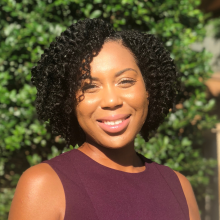February 2015 Spotlight on the SRCD Policy Fellow: Michelle Boyd, Ph.D.
2014-2015 Federal Executive Branch Policy Fellow
Placement
I am in my third year of the SRCD Policy Fellowship – I did the Congressional Fellowship for a year and am now completing my second year of the Executive Branch Fellowship. My current placement is with the U.S. Department of Health and Human Services in the Office of the Assistant Secretary for Planning and Evaluation (ASPE). At ASPE, I work in the Office of Human Services Policy within the Division of Children and Youth Policy.
Portfolio
My work at ASPE focuses on policies and programs that affect youth and young adults (typically defined as young people ages 10 to 24). The topic areas in my portfolio include: bullying, financial literacy and education, and violence prevention. A majority of my work involves interagency coordination and collaboration. This includes participation in various interagency workgroups and efforts, for example the Federal Partners in Bullying Prevention, Financial Literacy and Education Commission, National Forum on Youth Violence Prevention. One of my primary responsibilities is to help staff the Interagency Working Group on Youth Programs (IWGYP), a collaboration of 18 departments and agencies that support youth-focused programs and services. This includes facilitating monthly meetings of the IWGYP representatives, coordinating initiatives of the Working Group (e.g., developing and disseminating a research agenda on positive youth development), and helping to maintain the Working Group’s public website (FindYouthInfo.gov).
Reflections
I am fortunate to be able to focus on the policies, programs, and services impacting young people from middle childhood to young adulthood. It is a broad age range, but it includes periods of the lifespan that have personal significance based on my education, training, and research experiences. In addition, I find it exciting to think about efforts and initiatives across departments and agencies and consider the linkages. The lives of youth – especially those that are vulnerable, at-risk, or proven risk – can be complicated. At different points, they can be dealing with a variety of matters related to education, housing, employment, health, among others. And often a young person is dealing with multiple issues simultaneously. Because of these realities, it is important to consider how such areas coalesce and interact. These complexities demonstrate the need for coordinated and collaborative efforts to effectively support young people in being healthy, productive, capable, and thriving.
